Play Critically was provided with a review code for this videogame.
Alchemist Simulator is a simulation puzzler about a young person who must take over their grandfather’s alchemy workshop when the old potion maker goes off on a quest around the world. Taking the role of the apprentice alchemist, I must master their grandfather’s tools while learning how to brew an array of potions. Once I’ve learned some basic recipes, I can begin accepting contracts which will support their education and their career. Over weeks and months and maybe even years, I guide the apprentice in their career to fame, fortune, and the ultimate rank of Diamond Grandmaster.
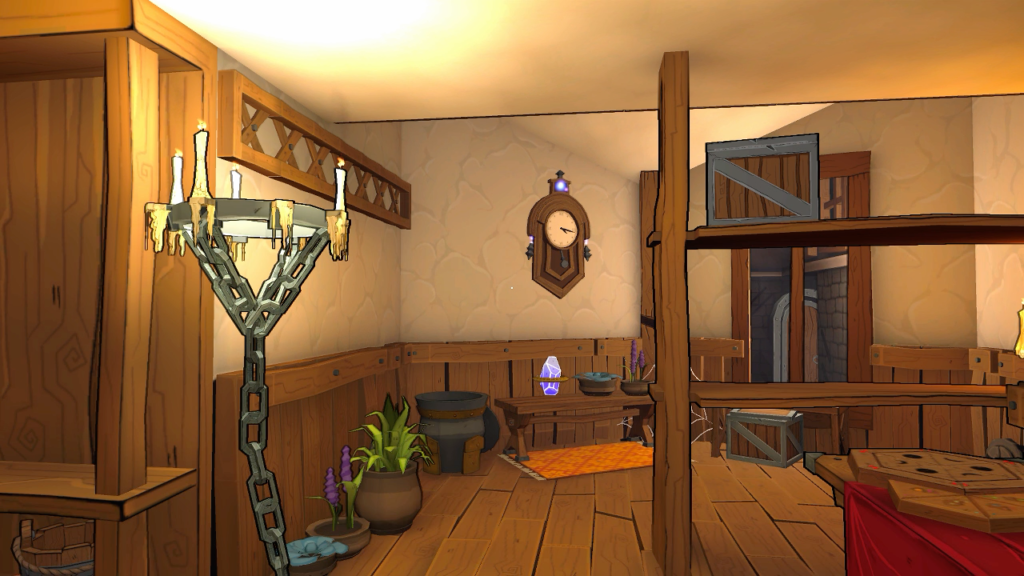
I spend the entirety of Alchemist Simulator in an alchemist’s workshop. It’s a cramped space overflowing with books and enchantment. A chandelier stands in a corner, a chain stretching beneath it to the floor, and it takes me a moment to realize that it’s being pulled upwards by inverted gravity. A glowing gem spins on a table, a gift from one of my grandfather’s mage acquaintances. Candles float freely around the workshop, bathing every surface in merry light. Rats scurry between cobwebs into their ratholes, popping out again to operate the machinery by running in tiny wheels. The whole space is portrayed by thick, uneven lines and bright colors—no matter how sinister the alchemist job sometimes becomes, its workspace always feels friendly and welcoming, workmanlike yet magical, setting a distinct tone.
I share the space with my grandfather’s former assistant, a giant talking rat. Dressed in an orange cardigan, leaning on a stubby cane, and with a pair of thick red glasses perched on her pointed nose, she projects a stern and matronly aura. When I arrive for my first morning she gives me a huffy tour, shows me the almanac where all my alchemical knowledge is stored, then talks me through brewing my first potion. After this perfunctory introduction she leaves me to sink or swim, serving only as my connection to the market where I purchase ingredients and sell my concoctions. I progress in my alchemy career by completing potion brewing lessons and contracts via correspondence retrieved from a mailbox bolted to the workshop’s front door.
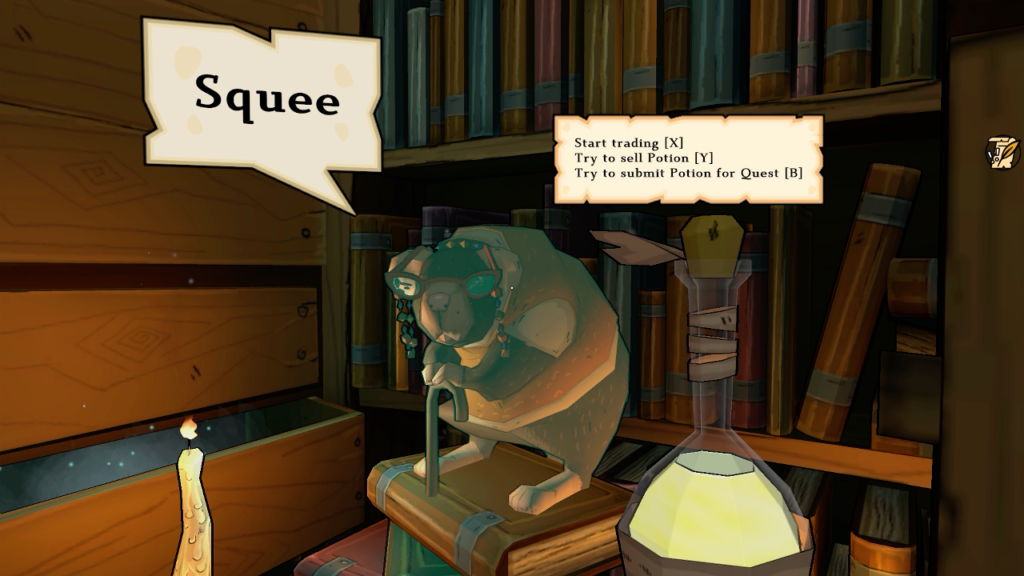
Brewing a potion isn’t as simple as dumping ingredients into a cauldron according to a recipe. Each ingredient is composed of two or more smaller elements. It is these elements, not the overall ingredient that contains them, that are needed for potion recipes. Each element is divided into four scales: Life and Death, Fire and Ice, Order and Chaos, and Purity and Corruption. Each scale has six or more steps that each ingredient’s elements exist within. Removing unwanted elements from ingredients then changing the ones that remain composes the bulk of my interaction with Alchemist Simulator.
In order to get the elements I need to brew a potion I must use my alchemist’s tools: the cutting board, the mortar and pestle, and the drying rack. The cutting board removes an entire elemental scale from an ingredient. The mortar and pestle shifts the remaining elements inward on their scale one step. The drying rack shifts elements outwards one step. The drying rack can be used on an ingredient multiple times. The cutting board and mortar and pestle can only be used once.
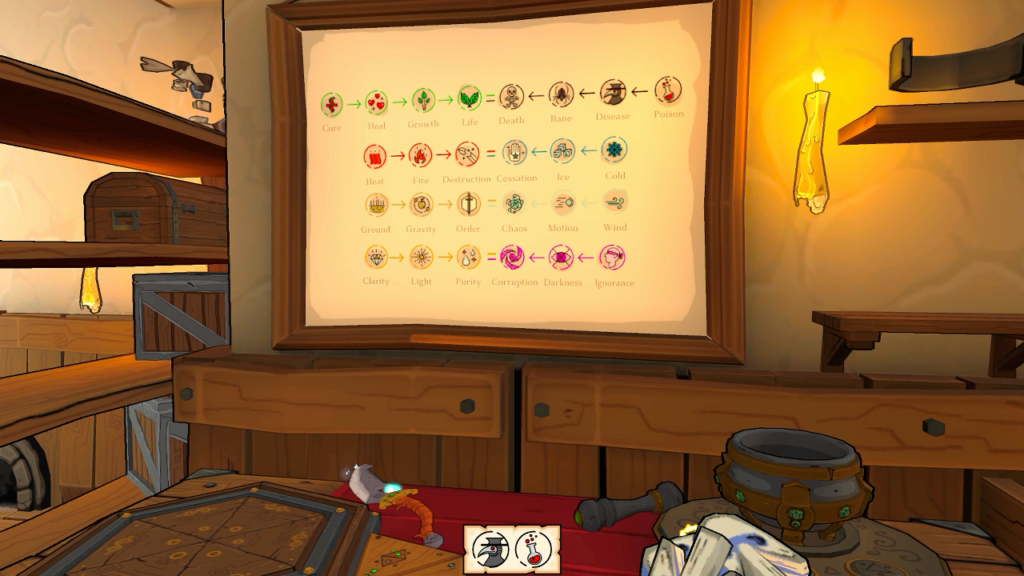
As an example of manipulating elements, let’s look at exactly how to brew a Healing potion, the contract the grandmotherly rat guides me through in the tutorial. A Healing potion consists of the elements Heal and Light, of the Life and Death and Purity and Corruption scales respectively. Consulting my almanac, I see that Coal (containing Fire and Cure) and Carambola (containing Order, Clarity, and Light) will get me close to the elements I need. I purchase the ingredients from the grandmotherly rat then open the delivery crate near the front door. The ingredients fly out when I open the lid, magically sorting themselves onto the workshop’s many shelves.
Taking the Coal from a shelf, I put it on the cutting board and cut out the Fire and Ice scale. This leaves only the Cure element on the Life and Death scale. Consulting the chart hanging above my workstation, I see that my desired Heal element is one step inward from Cure. I use the Mortar and Pestle to change the Cure to Heal, then drop it in the cauldron.
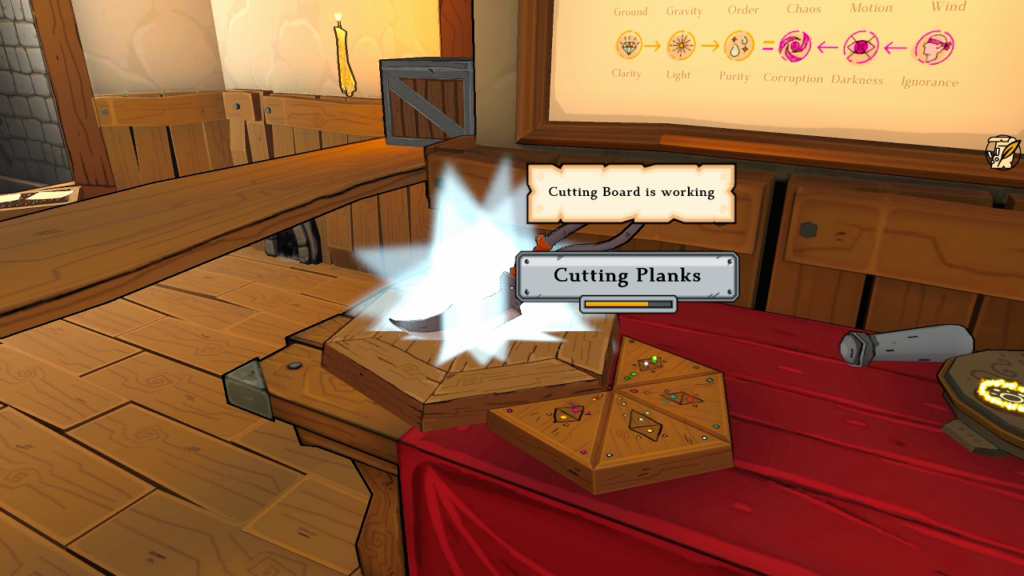
Next, I need to turn the Carambola into a Light element. Using the cutting board, I cut out the Order and Chaos scale, leaving only Clarity and Light. It will take some finesse to turn these two elements into the single Light element I need. I carry my cut Carambola to the window and place it on the drying rack. After a few seconds, all the elements shift outward on the scale: The Light element becomes a second Clarity, and the Clarity element is pushed outward off the scale, disappearing entirely. Now with a single Clarity element, I grind my cut and dried Carambola in the Mortar and Pestle, pushing the Clarity back inward on the scale, reverting it to Light. I drop the processed Carambola into the cauldron with the processed Coal and set the cauldron to brew. After a few seconds a Healing potion appears, which I can carry back to the grandmotherly rat to complete the contract.
The Healing potion is one of the simpler potions to brew. More difficult potions require more disparate elements that take additional ingredients and steps to get those elements. Producing a potion becomes a puzzle whose solution becomes increasingly elaborate as I take on more and more difficult jobs.
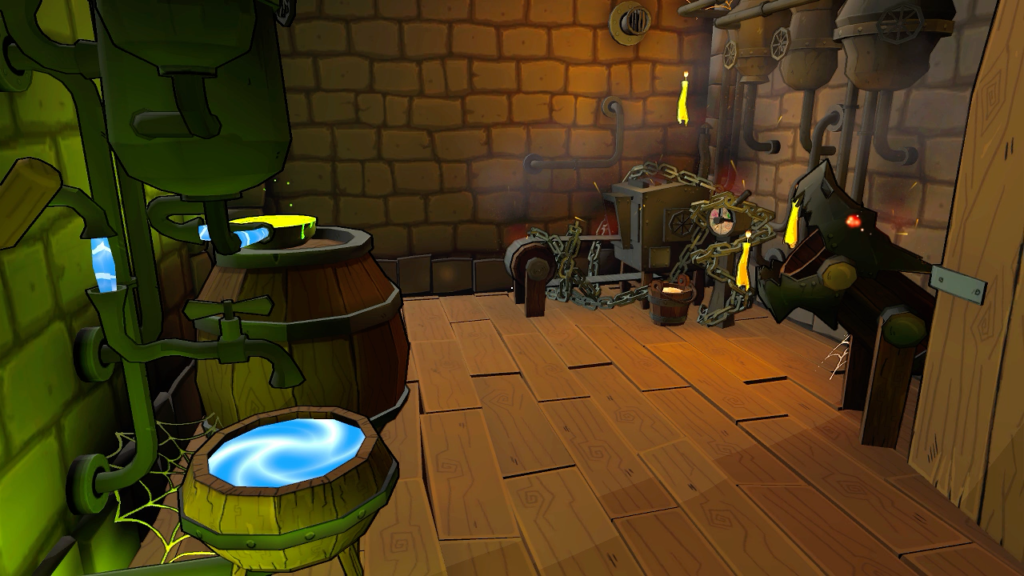
But solutions never become too elaborate. As I complete contracts and my fame grows, the grandmotherly rat allows me access to additional tools stashed away in the workshop’s shadowy back room. These tools offer new ways to manipulate the elemental scales and the positions of elements on them, but I complete every contract without once using them. The basic tools are sufficient to craft every possible potion. The additional tools let me brute force more direct paths to the elements I need at the cost of more expensive ingredients. Since there is always a direct path to every potion using cheap ingredients and basic tools, I simply never find a good reason to use the advanced tools or the expensive ingredients.
Despite my disappointment that there are no advanced recipes that can only be created using the advanced tools, I still find Alchemist Simulator an engaging puzzler.
Where I find Alchemist Simulator less engaging is its simulation aspects. While navigating the different elemental scales I must also balance time and gold.
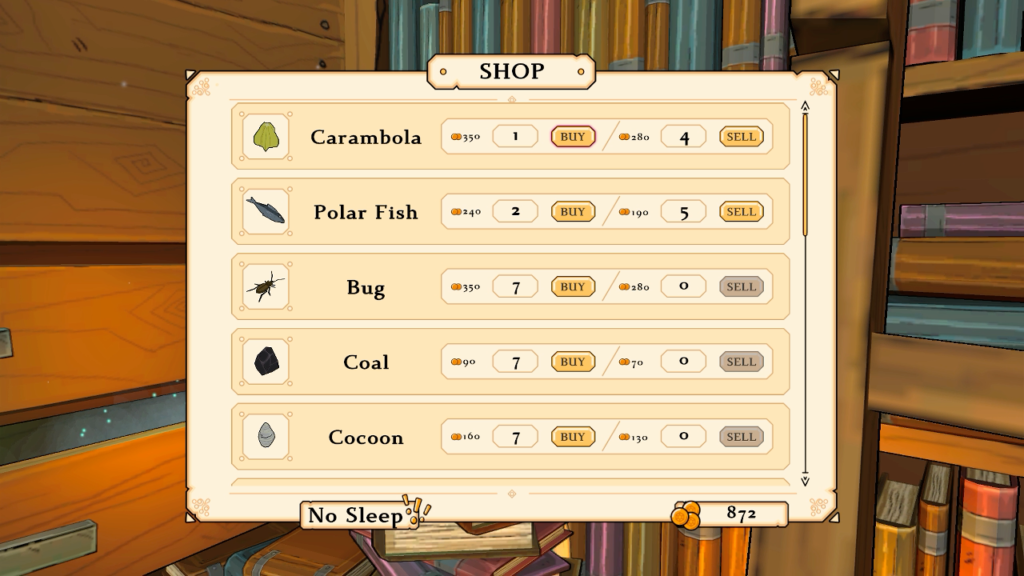
Every ingredient I purchase costs gold. At the outset, my limited gold reserves prove my greatest obstacle. It is all too easy to bankrupt myself buying ingredients while I am still learning how all my tools work. I do earn gold for completing contracts, but the reward is often less than the ingredients to brew the requested potion, particularly early on. A far more lucrative income source is selling Potions of the Day, a rotating set of potions I can sell through the grandmotherly rat to earn extra gold. Creating the Potion of the Day over and over simply to earn enough money to survive dominates the first few hours of Alchemist Simulator. This tedium simulates the drudgery of a tradecraft but isn’t necessarily entertaining as a videogame.
In addition to managing my gold, I must also manage my time. Alchemist Simulator is divided into working days that last in-game from 9am to midnight. Time ticks away whenever I’m not reading a letter, consulting the almanac, or buying ingredients, each day lasting about seven and a half minutes. As with gold, I feel this limitation the most at the outset. Every ruined ingredient costs me time as well as money. Thankfully, there is a “Restart Day” option that lets me revert to the morning of the current day. I indulge this function frequently when I make a mistake or fail to finish my contract in a single day.
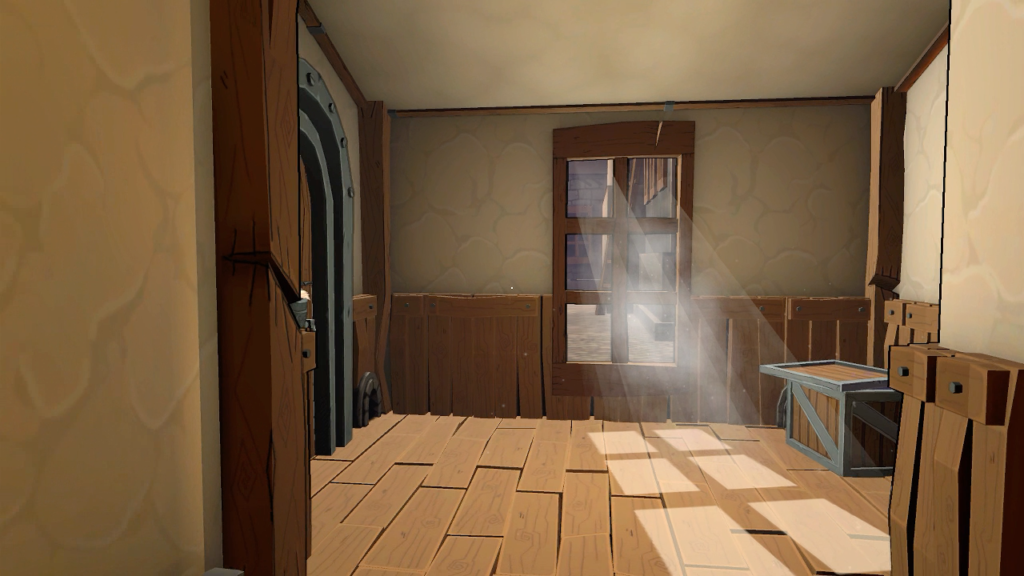
As a matter of survival I settle into a comfortable pattern: First thing in the morning I complete a single contract from my mailbox, then spend the remainder of my seven-and-a-half minutes brewing as many Potions of the Day as I can so I can afford to buy ingredients tomorrow. Rinse and repeat for a few hours until I finally have enough money saved to focus entirely on completing the last batch of especially lucrative contracts.
Normally Play Critically reviews are console agnostic, but as I played the Switch port and felt my experience was significantly impacted by that choice I feel obligated to make an exception and describe the troubles I encountered.
The point-and-click interface is translated poorly to consoles. Where on PC I will intuitively use a mouse to click icons that turn pages in the almanac or browse through the grandmotherly rat’s ingredients, on Switch I use the directional pad to navigate through these same icons. The highlighting that indicates the currently selected icon is barely visible and pressing left, right, up, or down often does not move the highlighting in a logical way. My single most perplexing moment with the Switch port occurred in Alchemist Simulator’s very first task: I must “sign” contracts before I can accept them, and for some reason this command is assigned to the left directional button. There is nothing in the interface which tells me this.
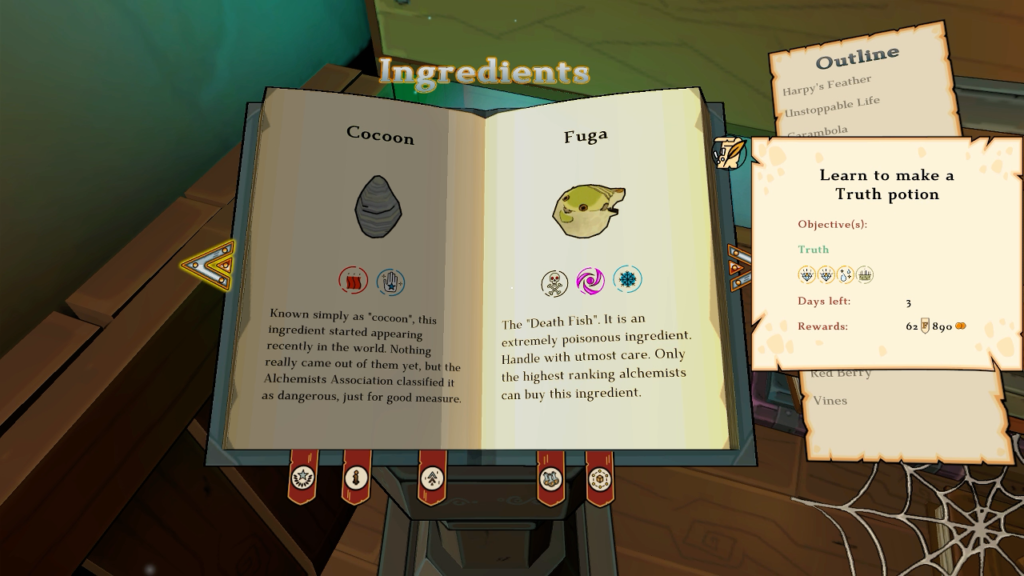
There is also a general lack of visual communication on how I can store items in all platforms. Since processed ingredients cannot be put back onto shelves with unprocessed ingredients, I end up throwing many of them away when I need to tend to another ingredient or turn in a completed potion. It is many hours before I discover there are special shelves above the Mortar and Pestle where processed ingredients may be placed temporarily. If anything tells me this is what those shelves are for, I do not see it.
I hope the Switch port gets updates which improves these shortcomings, but it’s playable with effort. The PC version seems to be the preferable platform on which to play Alchemist Simulator.
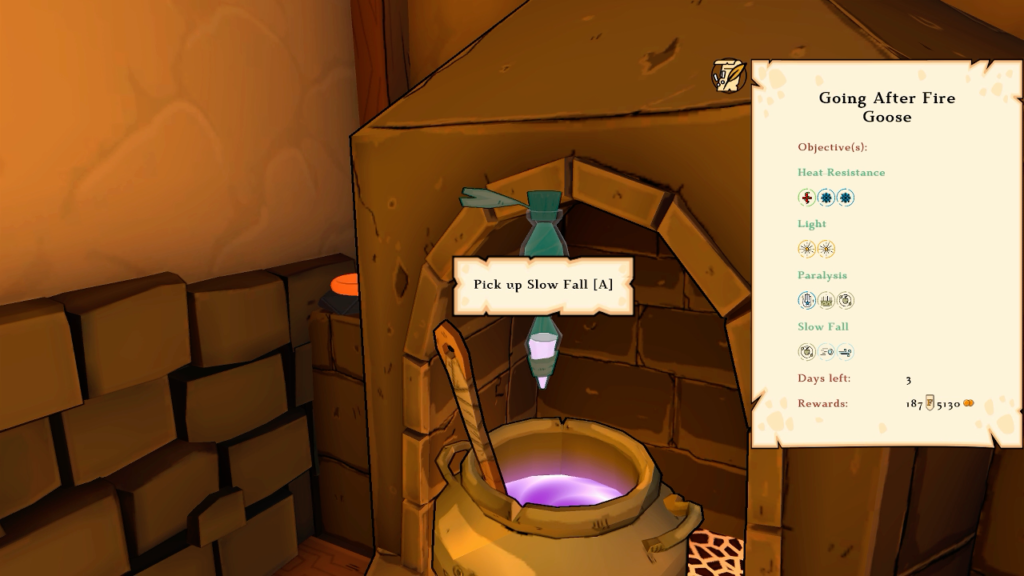
Alchemist Simulator is a unique magic puzzler with appealing visuals and theming which is hobbled by its much less interesting simulation aspects. Learning to extract and manipulate elements within ingredients to create a potion is a fascinating and engaging spin on following rote recipes. I only wish the advanced tools I unlock as my fame grows led to more intricate potions. They do not, and the puzzle solutions I use at the start are the same solutions I use at the end, only with more steps to keep track of. Trying to cram as many Potions of the Day into a seven minute day to stay financially afloat might be an accurate simulation of a tradesmans’ life in a medieval fantasy world, but I find myself much more interested in solving alchemical puzzles than tracking financial minutiae. Once I become solvent and can pour all my focus into the most difficult and valuable endgame contracts, I truly enjoy Alchemist Simulator.